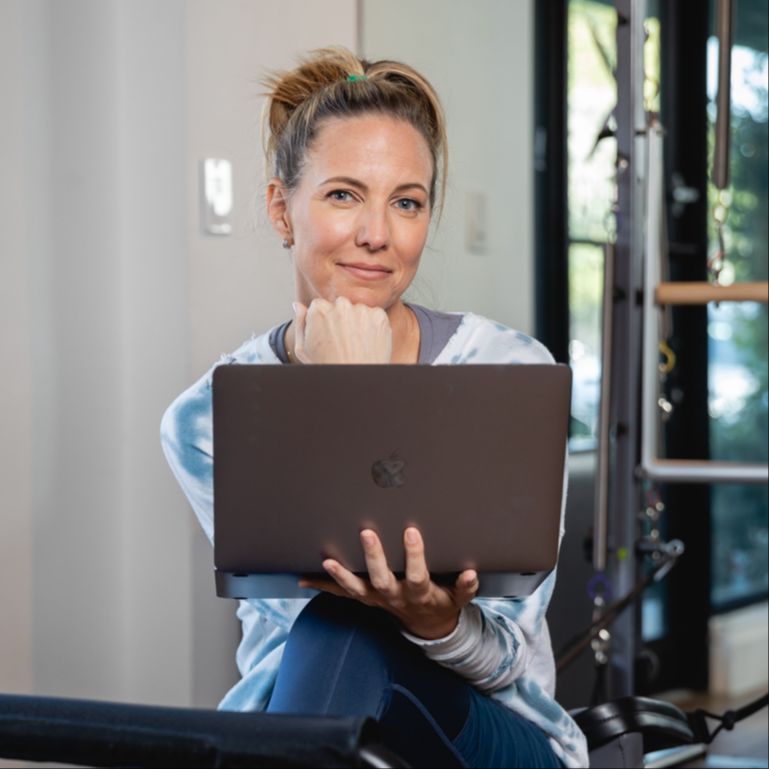How to Achieve More by Doing Less
Jul 13, 2022
Is “busy” different from “productive”? Short answer? Yes. And the difference between these two terms is not only important, but crucial to understand for the health of your business! Busy vs productive work could mean the difference between burnout and success. When you overwhelm yourself with tasks or try to do everything by yourself (because you might think only you can do it), you’re actually hurting yourself and what you are trying to build with your business.
The hard truth is that we all only have 24 hours in a day, and if you don’t learn how to manage those hours for success not only in your business life, but also in your personal life, you won’t be happy with the outcome. Luckily, I interviewed someone recently who I think you’ll be excited to learn from.
Meet Genevieve Pepin
Genevieve Pepin is an accredited life coach, certified mindset specialist, productivity and leadership development coach, improv facilitator, AND podcast host. But before all of this, she built her career internationally in event planning and marketing. Not only does her resume speak for itself, but her experience as a biz owner backs it up!
Genevieve works individually with those who are stuck in a cycle of being busy and stressed and brings them to a place of happiness and productivity using coaching techniques and mindset training. She knows all about burnout – admitting to having experienced it herself – and seeks out those who have big dreams but can’t find a way to work through them on their own.
When asked if busy is different from productive, Genevieve shared some of her international experience to compare what productivity looks like globally and culturally compared to here in the states. For example, Spain’s two-hour lunch break. Would you even know what to do with two free hours in the middle of your work day? But these systems are ingrained culturally to promote healthy boundaries and productive working techniques, proving that this question goes so far beyond a simple yes or no answer. It is steeped in the cultural climate of our work day, of how we conduct ourselves in business, and maybe it’s not working for us as well as we think it is!
So how does Genevieve model her coaching to help “high achiever” types with the strategies they need to establish the healthy boundaries that aren’t engrained? It’s a three-step model that has shown very successful results.
Mental fitness
Genevieve counts this as positive, focused driven thinking techniques to reset mindfulness. These practices strengthen and expand your ability to handle stress, information, tasks, and other important aspects to being successful
Direction
This covers answering questions such as, where are you going, and when you get there, what is your vision, and what are your goals? Identifying these will help guide you to the place where you WANT to be, not where you think you need to be.
Understanding your day to day
Once you have a sense of mental fitness and direction, the third step is implementation. Use the core knowledge to decide how you spend, prioritize, and set boundaries with your time.
It’s a tiered process that Genevieve has created to help develop what you need to do to be able to protect yourself (as a human, because we are still that, after all!!) while still maintaining the success you want out of all the efforts you put in for your business.
Letting go: The importance of delegation
Something important to note during the process of time management and that journey to more mindful business practices is the art of delegation. You know, letting GO of the things we can to protect the things we might not be able to release. (Yes, this is a lesson in control, peeps!)
As high achievers, we can easily double down on our to-do lists and say things like, “It's just easier for me to do this by myself because I’m the only one who knows how to do this.” And what can you say to someone like that?
Genevieve’s process has already considered this scenario.
She explains that, in order to be in the mind of the high achiever, you have to understand that delegation must begin with the acceptance of just letting go of that tight grip, even if at first it’s just a little. Finding that one thing that someone can potentially say no to in their to-do list and then identifying tasks around that one thing. This game plan gets the high achiever to try thinking realistically about their time, and how much they can fit into their day.
The first step to accepting delegation is to understand that we ALL only have 24 hours in a day, and we are all in different seasons of our life!! Maybe you have small children, maybe you have older children, maybe you’re married, or maybe you have other responsibilities outside of your work day that take precedence. All of these possibilities are OK, but that might mean that you can’t do everything on your own, which can be a hard pill for small biz owners to swallow.
Learning delegation also means understanding how to best effectively use your time. If you know that you can’t build or design websites, using 3-4 hours out of your day to try and do that instead of something you CAN effectively do is not only a waste of time but a potential waste of the money you could be making doing something else with those 3-4 hours.
For Genevieve, she stresses helping people understand that they don’t have, nor do they need, to have all the bandwidth to do absolutely everything. By trying, they're actually losing money. And isn’t that the harder pill to swallow? Stressing delegation is a priority, in this case.
Avoidance and further practices
By facing our ability to avoid the things in front of us we can become more mindful. But how do you do that?? Train your mind to look at the things that you’re already telling it to ignore? It starts with facing a hard truth.
❗ We only have about 3-4 steady, productive hours in a day ❗
When you accept this you can then identify your 3-4 hours and block that time for your most important daily tasks. Time-blocking is a HUGE help in avoiding avoidance. (is anyone confused? It helps to read it twice!)
This is how you prioritize. Identify those 3 things you can get done in your productive hours, then identify 3 things you might want to do that are LESS productive (and this is how we stay human!).
When asked how Genevieve best organizes and prioritizes her own time, and what advice she has for her clients, she recommends journaling (her go-to!) but is willing to work with whatever system her clients have, if any, already in place. And while planners may work for some people, project management tools like Asana work for others. Using what works for you and what you can maintain is always best. Simplicity is the name of the game, and you don’t want to use a tool to complicate your day even more. Make it sustainable to your needs.
Protect your time
It might seem like it’s too late to change your “high achiever” routine, but that’s not true.
Learning how to peel back the layers and start again is really important, and surprisingly possible with the right guidance. Understanding that time and energy are two things we don’t get back in our life is important to understand why you should be doing whatever you can to preserve them.
And if you need help with knowing where to start, people like Genevieve Pepin are waiting to hear from you! Don’t let your high achiever status threaten your personal OR professional life. Reach out today to schedule a meeting with Genevieve, and begin seeing the positive side of doing less and making more.
And if you’re thinking, “It’s really time for me to delegate out and hire people,” I have just the thing for you. My masterclass, What You Need to Know About Hiring, can help you find the right people, make it easy to get them onboarded and tell you a lot about what to expect when you embrace delegating.
If you want to stop doing everything and feeling burnt out, grab your ticket to this immediate-access training. It’s just $19 and you can watch it at your convenience.
Lorem ipsum dolor sit amet, consectetur adipiscing elit. Cras sed sapien quam. Sed dapibus est id enim facilisis, at posuere turpis adipiscing. Quisque sit amet dui dui.
Stay connected with news and updates!
Join our mailing list to receive the latest news and updates from our team.
Don't worry, your information will not be shared.
We hate SPAM. We will never sell your information, for any reason.


